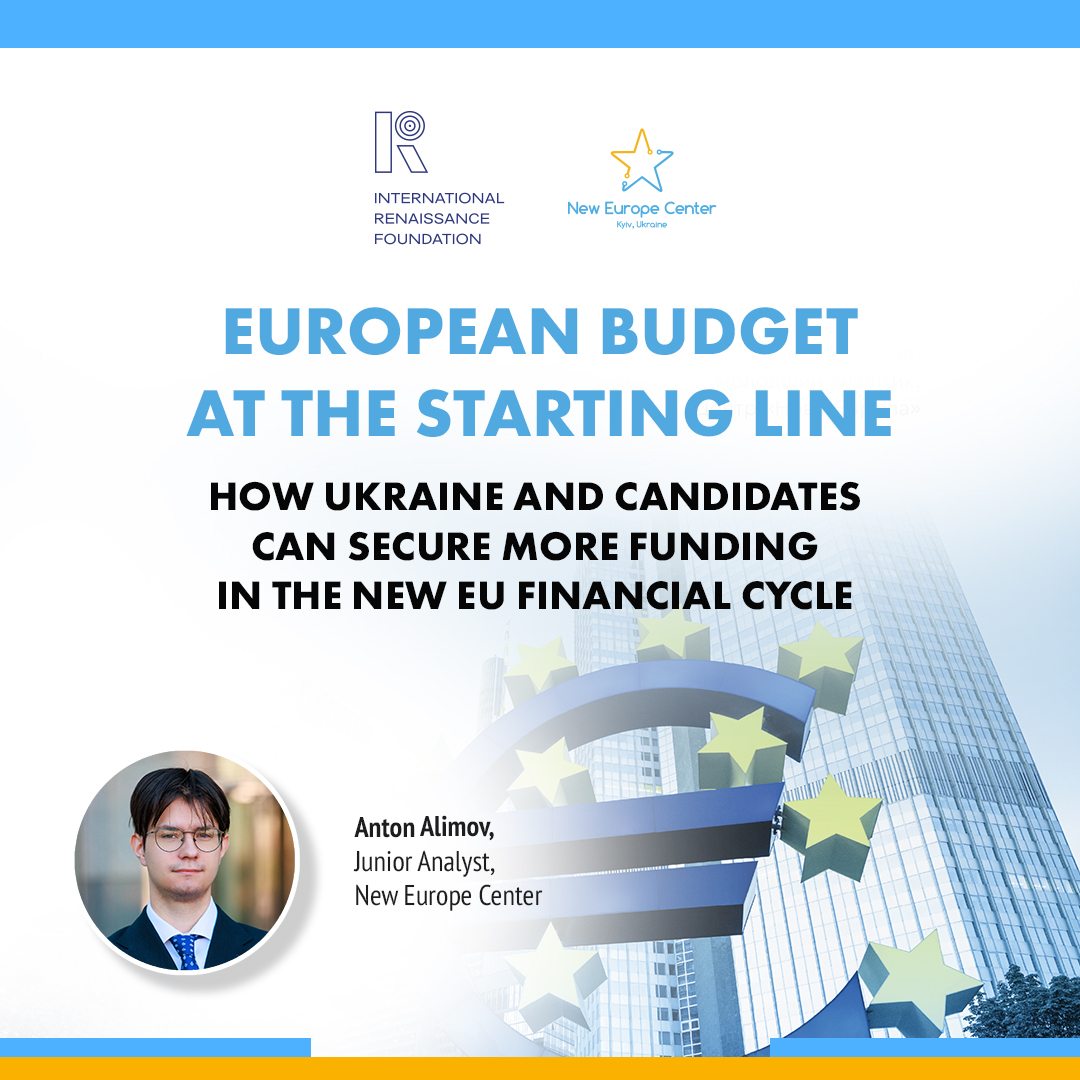
Anton Alimov, Junior Analyst, New Europe Center
Budget battles over the new European Union multiyear budget are gaining momentum. The first proposal from the European Commission outlined the battlefield for the players. Every country that is a member state or on the path to membership wants to receive as much support as possible through programmes financed by the EU budget. New geopolitical challenges and the prospect of new members joining create more opportunities for candidate countries. At the same time, the slowdown and, in some cases, the reversal of reforms significantly complicates negotiations on potential enlargement. This raises the question: how can Ukraine and other candidate countries strengthen their positions and financial support from the European Union?
New budget – new opportunities
There is a growing understanding within the European Union that significant changes are needed in order to respond to new challenges. This shift is already partly reflected in the draft new multiyear budget (so called Multiannual Financial Framework or MFF) for 2028-2034, presented by European Commission President Ursula von der Leyen in July 2025. Overall, the first budget proposal can be described as an attempt to respond to the new geopolitical realities on the continent. This opens up new opportunities, for strengthening European Common Foreign and Security policy, setting up common defence system and increasing Europe’s competitiveness.
Expenditure on competitiveness-related programmes will see the largest increase. According to the European Commission[1], financial programmes related to competitiveness will increase by €178 billion. This includes areas related to technological progress, innovation, security and defence. Such an increase in spending could theoretically mean stronger security and defence cooperation for Ukraine in the long term, as joint defence initiatives will be financed by the European Competitiveness Fund (ECF). Given Ukraine’s advanced experience in a number of military areas (primarily electronic warfare and drone technology), such cooperation could be beneficial to both sides and contribute to accelerating integration in the defence sector.
Another important change for Ukraine and candidate countries will be the strengthening of programmes related to enlargement and foreign policy. The Global Europe programme, which is responsible for foreign policy, international cooperation and development, will grow from €70 billion to €215 billion[2]. This means closer cooperation between the European Union and its international partners, which will strengthen the EU’s geopolitical role on the global stage. However, it should be noted that comparatively this is the smallest pillar of the EU budget. A possible advantage for candidate countries is that Global Europe provides for the allocation of funds for them as well. This will also help to provide additional funds to complete the necessary reforms and transformations within these countries on their path to European Union membership.
A separate item for Ukraine is the continuation of the Ukraine Facility by adding a Ukraine Reserve programme to replace the current Ukraine Facility (€50 billion in 2024-2027). This special mechanism is designed to provide long-term support to Ukraine. The European Commission proposes to allocate €100 billion in aid in the framework of this instrument. The proposed amount will constitute important macro-financial assistance for Ukraine, linked to specific deliverables and reforms, an instrument of sustainable support, as well as the much needed funds for further reform process. However, this amount is not sufficient for the full reconstruction or development of Ukraine’s sustainability. The Ukraine Reserve should be seen as an instrument that will cover Ukraine’s urgent budgetary needs. However, for implementation of European integration measures (through the introduction of the Instrument for Pre-Accession Assistance for legislative and regulatory changes for Ukraine) and reconstruction requires the mobilisation of more funds at the European or bilateral level. The World Bank right now estimates financing of Ukraine’s losses at more than 500 billion dollars[3]. When we compare future Ukraine Reserve to current Ukraine Facility programme, there will not be a substantial increase in support: Ukraine Facility provides 12.5 billion euros annually, whereas Ukraine Reserve increases this figure to 14,2 billion euros.
Reforms or bust
Despite increased spending in areas that indicate the EU’s growing geopolitical role, the EU budget is focused more on the interests of the European Union. But even with the focus on internal issues, there is considerable scepticism about the adoption of the MFF in its current form.
Firstly, the draft budget has been criticised by European farmers for not paying enough attention to internal issues, particularly agriculture. The EU’s Common Agricultural Policy (CAP) is one of the areas that will lose the most funding, from €420 billion to €302 billion. This sharp reduction has caused outrage among this group, who have already protested against the reduction in subsidies. A serious risk to the adoption of the MFF is that agriculture issues could be used by Eurosceptic forces within the EU to put pressure on European institutions and strengthen their own positions. Therefore, the European Commission will most likely have to reconsider the reduction in CAP spending.
Some leaders of member states also have already expressed their dissatisfaction with the MFF. Representatives of Germany opposed proposals[4] to increase taxes on electrical waste, tobacco products and companies with high turnover, as well as the joint borrowing mechanism. Viktor Orbán also voiced criticism, calling the budget ‘built on the logic of war’[5] and noting that it does not serve the interests of the European Union. Some experts, particularly those from the Bruegel research centre, reacted sceptically[6] to the budget proposal, noting that despite its well-set priorities, the MFF does not respond to all the challenges facing the EU. That is why there is a danger that the MFF proposal and priorities will become even more blurred during the ongoing search for a compromise. Such general scepticism within the EU regarding the draft budget jeopardises the possibility of its further support.
For candidate countries, the central challenge is that the proposed budget does not provide for separate funds for possible EU enlargement within the MFF (2028–2034). If all the necessary conditions for accession are met quickly by the candidate countries, the European Union may find itself financially unprepared for enlargement, as this item is currently missing from the draft. The opening of negotiation clusters for Ukraine will create additional preconditions for the formation of a budget item on enlargement.
Although enlargement is said[7] to be “a strategic investment in peace, security, stability and prosperity in Europe” in official regulation, the lack of funds for enlargement in the budget suggests that European institutions and member states do not consider this a top priority in the next financial cycle. For candidate countries, however, maintaining momentum is essential for internal reforms and supporting European integration aspirations. This will enable the EU not only to respond effectively to security challenges, but also to consider future enlargement. The New Europe Center has been drawing attention to this issue for a long time. In 2024, at the Third EU Accession Exchange Forum[8] organised by NEC, experts agreed that the EU needs to change its discourse and focus on two key ideas on enlargement: The EU is not just about money, and the price of non-enlargement may be much higher than the accession of new countries.
For Ukraine, the situation may become more complicated if reforms are slowed down and commitments are not fulfilled. The example of Law No. 4555, which temporarily limited the powers of anti-corruption bodies in Ukraine, showed that such a danger can arise quite quickly and unexpectedly. European institutions effectively used their leverage, which, together with protests by Ukrainian society, forced the Ukrainian authorities to reconsider their decision. However, failure to fulfil other commitments under the Ukraine Facility has already cost Ukraine €3 billion and could cost another €2.2 billion[9]. This money can be obtained by making the necessary changes, but every delay and loss of funds creates additional budgetary threats for Ukraine and the risk of losing the trust of international partners. Internal threats to the continuation of reforms also have a negative impact on the opening of the first negotiation clusters this year, as it lowers the trust to candidate country. The corruption scandal surrounding Energoatom has only heightened European partners’ attention to transparency in public administration in Ukraine. In the future, European institutions will view such cases as a test of Ukraine’s ability to adhere to the principles of good governance, effective anti-corruption measures, and the rule of law.
Problems with reforms in candidate countries will give arguments to Eurosceptic forces within the EU that enlargement should be postponed, as those countries do not fulfill all requirements. Right now, Ukraine has a positive review[10] of the most reforms under EU acquis, with the exception of ‘Fundamentals’ cluster, where Ukraine has the most pressing issues. However, potential slowdown in reforms may also force European institutions to reduce the amount of funding provided under the Global Europe programme and focus on reforms within the European Union in the short-term perspective. Candidate countries should therefore prepare to defend their right to become full members while continuing to implement reforms.
How candidates influenced the budget
While reforms are non-negotiable, there are examples in the history of the European Union when candidate countries defended their interests and achieved more favourable results for themselves during accession and budget negotiations with European institutions. The most striking example is that of Poland during the CAP negotiations[11] in 2004, when Polish officials actively demanded increased payments for Polish farmers, in particular by refusing to sign the accession treaty if their demands were not met. This led to significant payments to farmers after the country joined the European Union (in 2004, direct payments to farmers amounted to 25%, and in 2006 – 35%, which significantly contributed to the development of Polish agriculture). However, this approach is unlikely to work today, as European institutions are much less tolerant of attempts at blackmail and have found ways to influence those who violate the integrity and unity of the EU. Another example worth noting is Croatia and its transformation of pre-accession funds[12] into full-fledged programmes after accession, which made it possible to continue funding and increase it from €94 million to €150 million. Ukraine could take this example into account and apply it to the Ukraine Reserve if the accession process moves quickly. It is necessary for Ukraine to obtain funding under the Instrument for Pre-Accession Assistance (IPA). But in order to receive these funds and to continue integration the key is still the conditionality principle, so it is not worth expect continued leniency in the context of reforms.
Compliance with all requirements is also necessary to disarm opponents of Ukraine’s EU accession within the European Union. Ukraine has already faced resistance from member states regarding the opening of negotiation clusters, primarily with Hungary blocking the process. In the future, accession negotiations will be complicated by member states’ fears of losing funding from European programmes, such as the CAP or the Cohesion Fund. Another concern of some member states is that Ukraine’s accession will change their status from net recipients of EU funds to net contributors to the budget. However, research by Bruegel[13] indicates that Ukraine’s accession will not change the balance of power within the EU regarding the distribution of funds. In addition, instability in relations with certain neighbours, such as Poland or Slovakia may further delay or complicate the opening and closing of clusters.
In order to limit the use of unjustified political pressure on Ukraine, it is necessary to qualitatively implement and improve relations with key EU countries, especially with the so-called net contributors to the EU budget, who will be setting financial ‘red lines’ in the next rounds of negotiations. It is also important to continue working with key European institutions, especially the European Parliament and the European Commission.
The non-governmental sector, whose voice is heard by the European Union member states governments and EU institutions, should not be underestimated. In this regard, it is important to coordinate the advocacy efforts of governmental and non-governmental stakeholders from all candidate countries. An important step in this direction was an open letter[14] to Members of the European Parliament regarding the inclusion of a separate article on enlargement for Ukraine, Moldova and the Western Balkan countries in the draft budget, which was joined by The New Europe Center.
In this letter, civil society organisations and think tanks from candidate countries call for the creation of separate budget lines for candidate countries, the preservation of the IPA mechanism, and the provision of funding in line with the results of reforms.
Conclusions and recommendations
In summary, the current budget presents both financial challenges and policy opportunities. Ukraine, like some other candidate countries (in particular, Moldova, Montenegro, and Albania), is at an important stage in the accession process. Increased foreign and defence policy spending by the EU could provide crucial financial impulse for a successful accession process for these countries. However, in order to make this possible, it remains critically important for all candidate countries to consistently carry out their own ‘homework’ and to strengthen cooperation with each other in order to effectively defend their interests at the European level.
Insufficient funds.
The Ukraine Reserve could become an effective mechanism for budgetary support for Ukraine in 2028-2034. However, this instrument would not be the general solution to the problems of post-war reconstruction and Ukraine’s further accession to the EU. This requires greater financial commitments from European institutions and member states. It is important to use Ukraine Reserve as soon as possible to further support Ukraine, as well as to consider introducing the IPA mechanism as an additional mechanism to support Ukraine’s European integration.
Multi-level advocacy.
To strengthen our position, we need to develop systematic, multi-level advocacy. This includes working with actors both within the EU and outside it, especially with other candidate countries. Constant dialogue with member states and European institutions, combating disinformation, and explaining the benefits of new countries joining at all levels will weaken negative sentiments about possible enlargement. Identifying common interests and advocating for them during negotiations with member states and European institutions will help secure greater financial support for candidate countries.
Transitional periods.
An important practical step for Ukraine is to establish transitional periods for the most sensitive budgetary issues, such as the CAP, which could reduce public and financial pressure on the EU while allowing Ukraine to continue the accession process and deepen integration in other areas.
Sustainable reforms.
To become a success story in the eyes of European officials, the Ukrainian leadership must clearly fulfil its commitments. It is not worth counting on the possibility of circumventing agreements with the EU. In the difficult conditions of war and subsequent post-war reconstruction, it is critically important for Ukraine to receive and strengthen financial support from the EU, so timely fulfilment of commitments is key to receiving funds and accelerating the accession process.
The author is grateful for the assistance in preparing this material to Tinatin Tsertsvadze, Advocacy Advisor on EU Foreign Policy at Open Society Foundations, Leonid Litra, Senior Research Fellow at New Europe Center, Visiting Fellow at ECFR, and colleagues who wished to remain anonymous.
The full analytical article is available here in PDF-format.
This material was prepared with the support of the International Renaissance Foundation. The views expressed are those of the authors and do not necessarily reflect the position of the Foundation.
[1] Proposal for a Council Regulation laying down the multiannual financial framework for the years 2028 to 2034, European Commission, 16 July 2025: https://eur-lex.europa.eu/legal-content/EN/TXT/?uri=CELEX%3A52025PC0571&qid=1753801194712
[2] See attachment 1
[3] Ukraine Recovery and Reconstruction Needs Assessment, World Bank, February 25, 2025: https://www.worldbank.org/en/news/press-release/2025/02/25/updated-ukraine-recovery-and-reconstruction-needs-assessment-released
[4] ‘Unacceptable’: Germany rejects von der Leyen’s €1.8 trillion EU budget plan, Politico, July 17, 2025: https://www.politico.eu/article/berlin-rejects-commissions-eu-budget-proposal/
[5] Viktor Orban, post from X, https://x.com/PM_ViktorOrban/status/1949476843582595180
[6] Zsolt Davas, “EU budget proposal: right priorities, too little ambition”, Bruegel, July 17, 2025: https://www.bruegel.org/first-glance/eu-budget-proposal-right-priorities-too-little-ambition
[7] See attachment 1
[8] Key messages of the speakers from the Session 4 of the 3rd EU Accession Exchange Forum, New Europe Center, October 14, 2024: https://neweurope.org.ua/en/en-klyuchovi-mesydzhi-spikeriv-chetverto-paneli-3rd-eu-accession-exchange-forum/
[9] Monitoring implementation of the IMF program and EU assistance (October 2025), RRR4U, October 2025: https://rrr4u.org/en/analytics/monitoringimplementation-of-the-imf-program-and-eu-assistance-october-2025/
[10] Ukraine Report 2025, European Commission, November 4, 2025: https://enlargement.ec.europa.eu/ukraine-report-2025_en
[11] Enlargement and agriculture: A fair and tailor-made package which benefits farmers in accession countries, European Commission, 20 December 2002: https://ec.europa.eu/commission/presscorner/detail/en/memo_02_301
[12] Croatia’s accession to the European Union, European Commission, June 28, 2013: https://ec.europa.eu/commission/presscorner/detail/en/memo_13_629
[13] Zsolt Darvas, “The impact on the European Union of Ukraine’s potential future accession”, Bruegel, April 11, 2024: https://www.bruegel.org/report/impact-european-union-ukraines-potential-future-accession
[14] 46 Civil Society Organisations Call on the EU to Embed Enlargement in the Next, Europa Plus, November 5, 2025: https://europe-plus.com/46-civil-society-organisations-call-on-the-eu-to-embed-enlargement-in-the-next/







